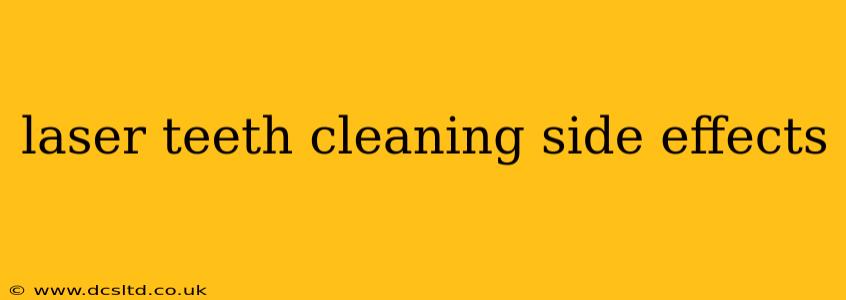Laser teeth cleaning, also known as laser scaling and root planing, is a modern dental procedure that uses lasers to remove plaque and tartar buildup from teeth. While generally safe and effective, like any dental procedure, it can have potential side effects. Understanding these potential side effects can help patients make informed decisions and manage any discomfort or complications. This comprehensive guide explores the common and less common side effects of laser teeth cleaning, addressing frequently asked questions to provide a clear and detailed understanding of the procedure.
What are the side effects of laser teeth cleaning?
The side effects of laser teeth cleaning are generally mild and temporary. Many patients experience no side effects at all. However, some potential side effects include:
-
Temporary tooth sensitivity: This is the most common side effect. The laser energy can temporarily increase the sensitivity of your teeth to hot and cold temperatures. This usually subsides within a few days or weeks.
-
Slight bleeding: Some minor bleeding during or after the procedure is possible, especially if you have gum disease. This is typically minimal and stops quickly.
-
Gum irritation or swelling: Your gums may be slightly irritated or swollen for a short time after the procedure. This is usually mild and resolves within a few days.
-
Temporary discomfort: You may experience mild discomfort or soreness in your teeth and gums for a short period after the procedure. Over-the-counter pain relievers can usually manage this.
-
Dry mouth: In some cases, laser treatment can cause temporary dry mouth. Staying well-hydrated can help alleviate this.
Is laser teeth cleaning painful?
Most patients report that laser teeth cleaning is not painful. The laser is used precisely and the procedure is generally comfortable. Your dentist will likely use a local anesthetic to numb the area before the procedure to ensure maximum comfort. However, some mild discomfort or sensitivity may be experienced afterward.
How long does it take to recover from laser teeth cleaning?
Recovery time is typically very short. Most patients experience minimal discomfort and can return to their normal activities immediately after the procedure. Any temporary sensitivity or swelling usually resolves within a few days to a couple of weeks.
What are the long-term effects of laser teeth cleaning?
The long-term effects of laser teeth cleaning are generally positive. By effectively removing plaque and tartar, it helps prevent gum disease and cavities, leading to improved oral health and a lower risk of future dental problems. There are no known long-term negative effects associated with this procedure when performed correctly by a qualified dentist.
Are there any alternatives to laser teeth cleaning?
Yes, traditional scaling and root planing (using metal instruments) is an alternative to laser teeth cleaning. Both methods achieve similar results in removing plaque and tartar. The choice between the two methods depends on individual patient needs and preferences, as well as the dentist's recommendations.
Does laser teeth cleaning whiten teeth?
Laser teeth cleaning itself does not whiten teeth. While it removes surface stains and plaque, it's primarily a procedure to improve gum health and prevent disease. For teeth whitening, separate procedures are necessary.
Is laser teeth cleaning covered by insurance?
Insurance coverage for laser teeth cleaning varies depending on your specific plan and the reason for the procedure. Some insurance plans cover laser treatments for periodontal disease, while others may not. It’s best to check with your insurance provider directly to understand your coverage before your appointment.
Conclusion
Laser teeth cleaning offers a generally comfortable and effective way to improve oral health. While mild and temporary side effects are possible, they are usually manageable. If you are considering laser teeth cleaning, it is crucial to discuss any concerns with your dentist, who can assess your individual needs and determine if this procedure is right for you. They can also discuss the expected outcomes and potential side effects in detail. Remember, responsible dental hygiene practices, including regular brushing and flossing, remain vital for maintaining optimal oral health regardless of the cleaning method.
